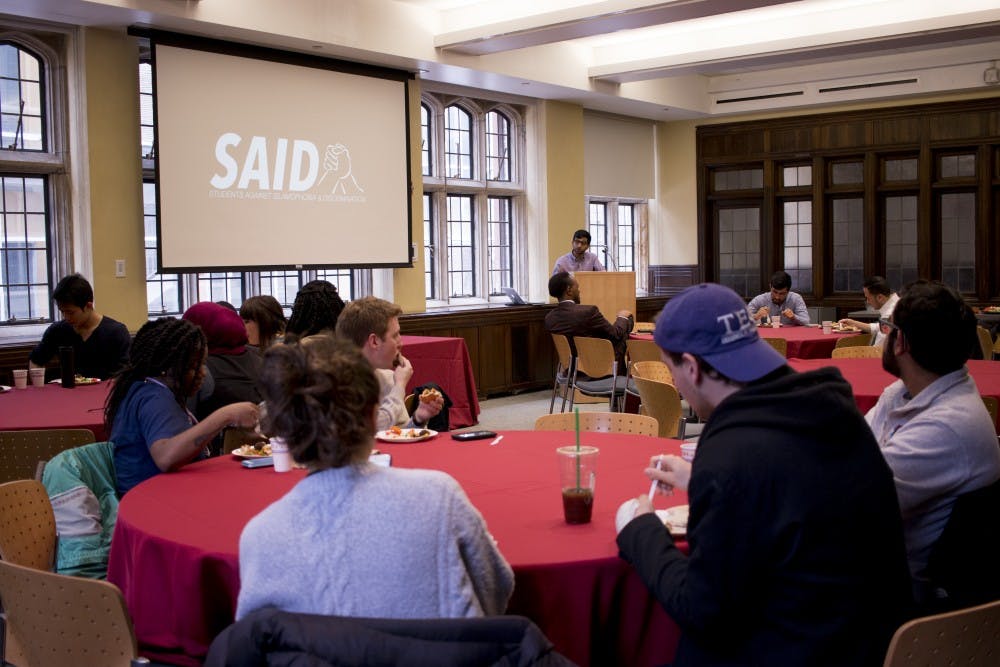
An anti-Islamophobia group has formed on campus, in response to rising discriminatory sentiment around the country.
Credit: Julio SosaIn the context of a wave of renewed anti-Islam sentiment in the country — exemplified by one presidential candidate’s call to ban Muslims from entering — a group is forming on Penn’s campus to stand up against discrimination.
On Monday a group of Penn students held a “solidarity luncheon” as the inaugural meeting for the new group Students Against Islamophobia and Discrimination. The group outlined its goals and called for minority groups to partner in the fight against prejudice.
They read a statement regarding Islamophobia, coauthored by 5B and the Penn Association for Gender Equity, and introduced their plan to combat Islamophobia on campus and in Philadelphia. SAID aims to facilitate dialogue, create programs and speak out against Islamophobia, according to the letter.
Wharton junio and SAID leader Majid Mubeen emphasized the organization’s focus on everyone affected by Islamophobia.
“Islamophobia affects not just Muslims, but anyone who can be construed as Muslim,” he said. Arab Christians and South Asian Sikhs, among other groups, are also affected, he added.
According to the statement, SAID members started the organization in response to recent incidents of discrimination in Philadelphia as well as Islamophobic rhetoric in the political sphere.
The group cited two recent incidents in Philadelphia that influenced its formation. In December 2015, a bloody pig’s head was found in front of the Al-Aqsa Islamic Society in North Philadelphia following a string of antagonistic phone messages. In January, a Muslim man and full-time student at Temple University was hospitalized after being verbally harassed and then beaten for speaking Arabic in Center City.
In spite of these incidents, SAID members said they take pride in their community’s connection to Arabic. Said, pronounced sa-eed, is a transliteration of the Arabic word for happy.
“We want to define ourselves and choose the way that we’re portrayed,” Mubeen said of the choice to use the Arabic pronunciation of the acronym.
Faculty members also spoke about their experiences with prejudice. Fariha Khan, associate director of Asian American Studies, stressed the need for different groups to unite because of their shared humanity. She also spoke about the parallels between Islamophobia and the anti-Catholic and anti-Semitic rhetoric that characterized earlier periods of American history.
“Islamophobia is not new — it’s just xenophobia in new clothes,” she said.
Associate Vice Provost for Equity and Access Rev. William Gipson emphasized the power of community. He described his trip with a group of interfaith university students and chaplains to concentration camps in Poland, comparing the effort to isolate Jews in Nazi Germany to efforts to isolate other minorities in America today.
“Good people of good will must always stand up,” he said.
The group intends to work with a diverse group of student leaders as well as University administrators. Representatives from other religious and cultural groups attended the luncheon to support SAID’s mission.
College and Engineering junior and PRISM co-chair Gautam Nagaraj praised the group’s mission to bring together minority groups.
“We have religious groups, we have minority groups [and] interfaith groups, but we rarely get to say that we’re all in this together and supporting each other,” he said.
The Daily Pennsylvanian is an independent, student-run newspaper. Please consider making a donation to support the coverage that shapes the University. Your generosity ensures a future of strong journalism at Penn.
DonatePlease note All comments are eligible for publication in The Daily Pennsylvanian.







